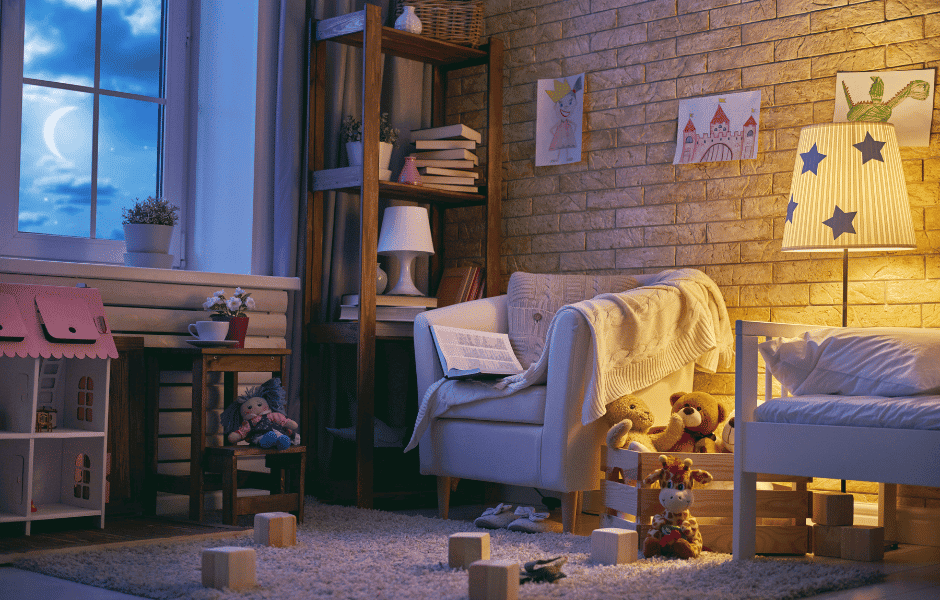“I’m scared!” A sudden and familiar yell comes from down the hall. Is your child afraid of their bedroom? Or expressing fear through the night? Fear is a real and significant emotion that can disrupt your child’s sleep and cause distress. In this article, we will explore the common issue of children being afraid of their bedrooms, provide practical tips to alleviate their fears, and explain how our sleep consulting services can support you and your child in overcoming these challenges
Understanding Bedtime Fears:
If your child is afraid of their bedroom or experiences fear during the night, rest assured that this is a common issue for many children. It can be concerning and distressing for parents, but there are strategies you can implement to help your child overcome their fears and restore peaceful and restful sleep.
Creating a Consistent and Calming Bedtime Routine:
The first step in addressing your child’s fears is to establish a consistent and predictable bedtime routine. Children thrive on routine, and having a calming routine can prepare them for sleep while reducing anxiety. Avoid activities such as screen time and sugary snacks before bed, as they can interfere with falling asleep and staying asleep. Think of this time as an opportunity for connection, while simultaneously preparing them for sleep.
Avoid activities such as screen time and sugary snacks before bed, as they can interfere with falling asleep and staying asleep.
Designing a Peaceful Bedroom Environment:
A serene and soothing bedroom environment plays a crucial role in helping your child feel secure and relaxed. Here are some tips to create the ideal sleep space:
Keep it quiet: Minimize noise disturbances in your child’s bedroom. Consider using a white noise machine or playing gentle lullabies to drown out any distracting sounds.
Maintain a cool temperature: Ensure the room is comfortably cool – between 20-22 degrees – to promote better sleep. Use light and breathable bedding to prevent overheating.
Declutter the space: A cluttered environment can contribute to feelings of uneasiness. Keep the bedroom tidy and organized, creating a peaceful atmosphere for your child.
Avoid too much dairy before bed: We’ve seen a clear link between consuming dairy products before bedtime and night wakings. It’s best to avoid giving your child (2 years and up) large quantities of dairy (bottles of milk, yogurt drinks) in the evening to help reduce night wakings.

Preventing Overtiredness:
Overtiredness can intensify fears and lead to restless sleep. Establishing an early bedtime for your child is crucial to prevent overtiredness and promote a more peaceful night’s sleep. A well-rested child is less likely to experience heightened anxiety and fear during the night. As a general rule, bedtime should fall between 6:30-8:00pm for children 18-months and older. This timing can depend on their daytime sleep and tired cues. These tired cues can look like red eyes/eyebrows, staring out into space, pulling ears, yawning, clumsiness, etc.
The Power of Responsive Parenting:
Being a responsive parent will have a profound impact on your child’s sense of security. When your child expresses fear or concern, it’s essential to be there to listen and reassure them. Let them know they are safe and loved, offering comfort and support. This responsive approach can alleviate anxiety and help your child feel more secure in their bedroom.
What to Avoid:
In your efforts to address your child’s fears, it’s crucial to avoid certain actions that can inadvertently worsen the situation. Here are three things to avoid:
Do not go looking for monsters: Seeking out monsters or validating their existence may reinforce your child’s fears. Instead, redirect your child to a story, teddy, snuggles, etc.
Do not force them to stay in a dark room with the door closed: Respect your child’s comfort levels and provide appropriate lighting if needed. Gradually work towards helping them become more comfortable in the dark. Alternatively, use a dim nightlight.
Do not shame them for feeling afraid: Validating your child’s emotions is essential. Shaming or dismissing their fears can increase anxiety and undermine their sense of security.
The Importance of Family Connection at Bedtime:
Remember, it is normal for children to feel scared or uneasy at times. By taking proactive steps to create a peaceful and calming environment for your child, coupled with a consistent bedtime routine and ample rest, you can significantly enhance their sense of security. Bedtime can become a cherished opportunity for family connection and bonding. Spend quality time with your child before bed, engaging in activities like reading stories, talking about their day, or practicing relaxation techniques. This positive and nurturing interaction will further strengthen their sense of safety and support.

Discover Personalized Support with Our Sleep Consulting Services:
If you’re facing difficulties in overcoming your child’s fear of the bedroom, our sleep consultants are here to help. We understand that every child is unique, and we offer personalized support and guidance tailored to your child’s specific needs. Our experienced consultants will work closely with you to develop a comprehensive plan that addresses your child’s fears and creates a sleep environment conducive to their comfort and well-being.
When you choose our sleep consulting services, you can expect:
Expert guidance: Our team of sleep consultants has extensive knowledge and experience in dealing with bedtime fears and sleep challenges in children. We will provide you with professional insights and practical strategies to help your child overcome their fears and achieve restful sleep.
Customised solutions: We recognize that every child is different. Our consultants will take into account your child’s unique temperament and sleep patterns to create a plan that suits their specific needs.
Continuous support: We are committed to your success. Throughout the process, our consultants will provide ongoing support by answering your questions, addressing concerns, and providing encouragement. We’ll be there with you every step of the way to ensure your child’s journey towards peaceful sleep is a positive and successful one.
Bedtime fears can be distressing for both children and parents, but with the right strategies and support, they can be overcome. If you’re experiencing difficulty overcoming your child’s fear of the bedroom, our sleep consultants can help. We offer personalised support and guidance to ensure that your child feels comfortable, relaxed, and safe in their sleeping environment.

